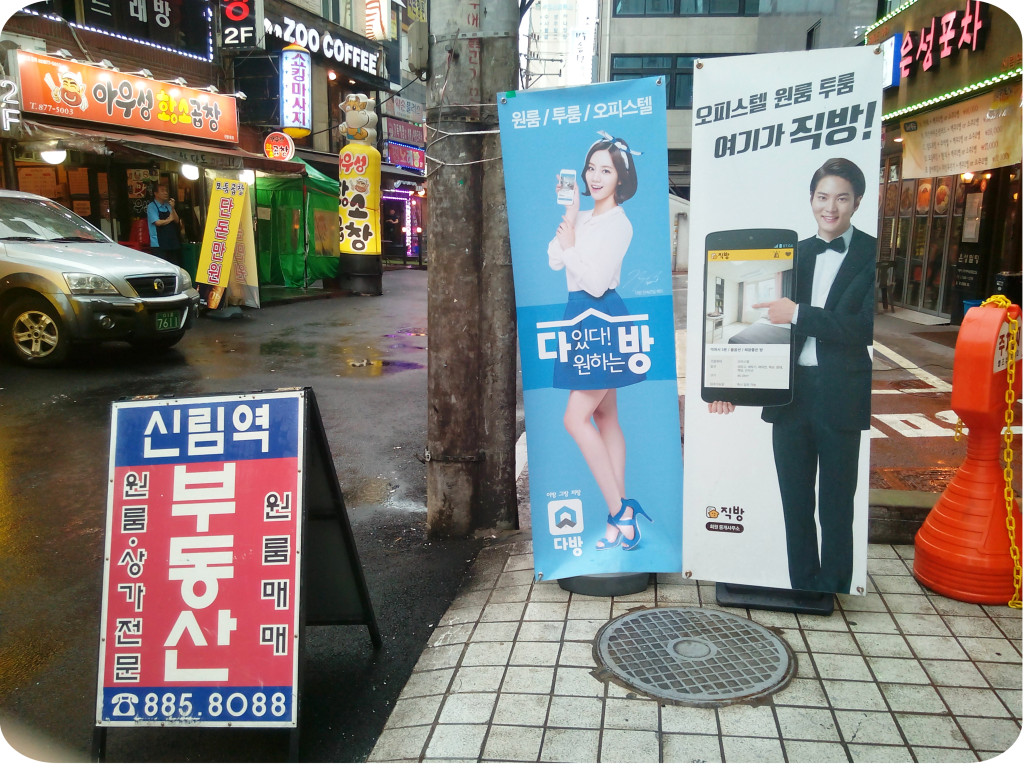[Note: I don’t talk much about prices in this blog post. Prices vary a lot depending on where you live, size of the accommodation etc.] Nowadays, there are a lot of people planning on coming to Korea either to study, work or just to do some sightseeing. For those of you who want to stay in Korea longer than, let’s say, a month, here are the most common long-term accommodations in Korea:
Guesthouse
Now, I know what you may think, a guesthouse isn’t the best option in the long run and not the cheapest either, but if you’re staying in Korea for just a few weeks, it probably is the most convenient option. Why? Simply because you can easily book it online on international websites without worrying about Korean skills etc. (since you most likely need to speak at least some Korean if you want to lodge in other types of accommodations, like some of those listed below). Also, guesthouses are the perfect choice when you come to Korea but don’t have anywhere to live yet. What I did, for example, was stay at Boa Travelhouse (former Boa Guesthouse) for two weeks while looking for an apartment.
Dorm
This option only applies to those who want to study either at a Korean university or language institute. Almost every university has at least one dorm catering to not just Korean, but international students as well. The dorms might be the best long-term accommodation if you don’t speak any Korean at all, but personally, I don’t think of it as the best option out there. You might need to share your room with someone else, you’re usually not allowed to eat in your room and most dorms even have curfews. I’m not saying that it’s the worst you can get, but if you want less restrictions, you should consider looking for something else, but if you’re fine with that, you can inform yourself about your university’s dormitory; they’ll certainly have some information on their website.
Goshiwon / Goshitel
Goshiwons are small rooms (and by small I mean around 6 square meters!) mainly rented by students because they are quite cheap and you can find lots of them in university areas. In some cases, you might have your own bathroom in the room, but most of the time you have to share washing facilities as well as the kitchen. On the other hand, they provide you with free internet, washing detergent and even food like ramen or kimchi. If you want to have a look at some goshitels, check out goshipages. Booking them in advance is a bit trickier though: First of all, you need to know some Korean, as the owner most likely doesn’t speak English and I heard that some goshiwons do not take pre-bookings online or over the phone, so you might have to show up in person in order to reserve a room. I recommend you look out for goshiwons while walking around the area you want to live in and just ask if they have a spare room.
Hasukjip (하숙집) (boarding house)
Those of you who watched “Reply 1994” (which you should, btw) will know what a so-called “hasukjip” is. It’s basically a boarding house generally run by middle-aged Koreans. Hasukjips are similar to goshiwons but there are some major differences: the room is bigger and the atmosphere is much more personal. You will most definitely get to talk to the owner and maybe even some other residents of your hasukjip and thus improve your Korean skills, which is definitely a plus. On the down side, most facilities are shared (but, hey, you’ll get free food). Check out some boarding houses here (website in Korean).
One-room apartment
I’ll warn you beforehand: one-room apartments (or any other type of apartment) are expensive. The rent itself might not be, but the security deposit without any doubt is. While rent can be as low as 300.000 won, deposits are always 5.000.000 won+ (keep in mind that you will get back that money after you move out, so it’s not just wasted), but if you’re willing to pay for that, you’ll get the, in my opinion, best option out of all the options available. It’s clear that you’ll have a certain freedom which people living in dorms, goshitels and hasukjips don’t have: you’re free to invite anyone you want into your apartment. A lot of you might have family or friends coming over to Korea to visit you. Well, if you have an apartment, you can actually accommodate a certain number of people and you don’t have to book something else. And it goes without saying that in an apartment, you have more personal space. Zigbang and Dabang are some great pages to look at apartments (both websites are in Korean). It is actually quite hard to get an apartment if you don’t have any basic Korean skills or a Korean friend to help you, because you’ll probably end up in a real-estate agency (부동산 – budeongsan) and you need to explain (in Korean) to the agent what you’re looking for. I recommend you bring a list with your criteria written down in Korean to avoid any possible misunderstandings. I will write about how I got my apartment in detail in the near future, so stay tuned for that ;).
That’s it for this post. I hope it was helpful and I wish you all good luck with finding the right accommodation!
Till next time,
Julie

